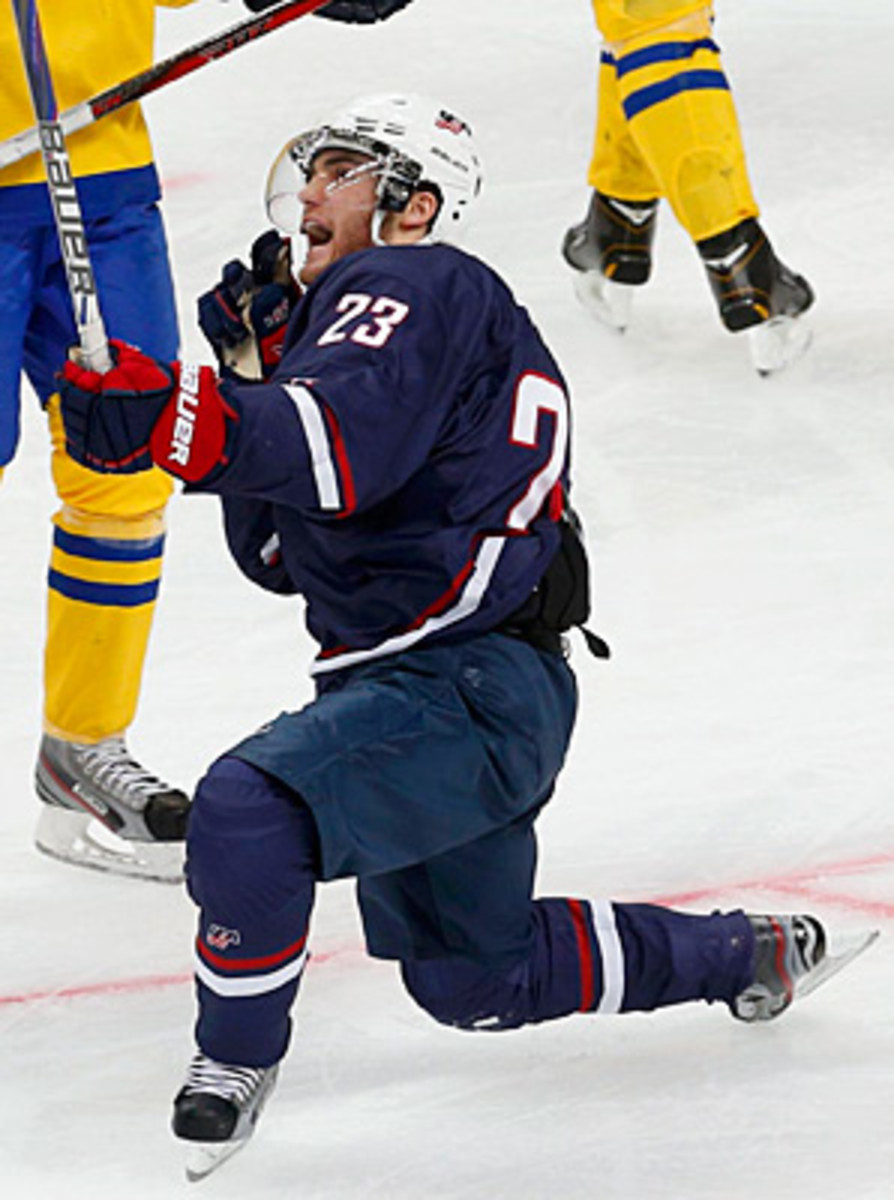Team USA caps stellar run with gold at World Juniors
At that moment, Rocco Grimaldi had to wonder if he ever was going to score.
Without a goal through the first six games of the 2013 World Junior Championship, the Team USA winger had the puck and a clean angle on Swedish keeper Niklas Lundstrom midway through the first period of the gold medal match. He had time and space, but his wrister clanked off one post then, cruelly, the other before skittering harmlessly into the corner.
But the hockey gods have a way of evening things out. Grimaldi, who started the tournament on the first line only to be benched for selfish play, finally earned his redemption with a pair of second-period markers. The second stood as the winner in Team USA's gold medal-clinching 3-1 victory.
The trip to the top of the podium is America's second in the last four years and, after wins in the U-17 and U-18 tournaments, suggests that this age group represents the most successful the country has produced.
The title was sweet redemption for a program that finished seventh in 2012, but the final itself was hardly the masterpiece that was its 5-1 semifinal win over the Canadians. There was no early imposition of its will, no air of inevitability about the proceedings. If anything, the Americans seemed rattled early on, maybe, finally, feeling the weight of the moment. Captain Jake McCabe coughed up the puck twice on one shift. Passes drifted off target. Battles along the boards were lost. Players settled for low-percentage options. Teammates tripped over each other. There were more left feet than a middle school dance.
But then Johnny Gaudreau took over late in the frame. The play of the tournament's leading goal scorer (seven in seven games) was a revelation for those who don't follow college hockey. It wasn't just his skill, though that was on ready display with his creative passing and quick release. It was his compete level. Watching the 5-6, 160-pound Boston College star go into the corner with players who had him by eight inches and 40 pounds and come out with the puck set a tone of accountability for the rest of the American lineup.
He clearly settled the team's nerves. Even when Filip Sandberg beat John Gibson with an unstoppable shot to open the scoring on an early second period power play, there was no anxiety. The goal broke a streak of 15 straight kills and forced the U.S. into playing from behind, but the players recognized it was a bouncing puck that went the other way. These things happen, just like Grimaldi's double-post.
As it turned out, it was the last goal Gibson would allow. It wasn't long after when his teammates found their legs and starting nullifying Swedish bids before they became dangerous opportunities. And when he was needed, the Anaheim prospect was there.
He was forced to make a big save on a shorthanded chance by William Karlsson and came up with a massive game-saving stop late in the third when Sandberg exploited a rare seam down low. Moments later, he was named the tournament's best goalie -- the sixth American to earn that honor -- and then, the MVP.
I'm not sure he was even America's best player -- that would be Jacob Trouba or Gaudreau -- but he definitely was its most valuable. The numbers -- a 1.36 GAA and .955 save percentage -- suggest he was the most dominant net-minder ever employed by the U.S. at the event, but even those don't tell the whole story. He was a huge presence in the net, giving the team the sort of confident, mistake-free goaltending that makes every player on the bench feel that much bigger, that much faster, that much more dangerous. That was his real value.
The Americans seemed to have a different hero each game. Saturday it was Grimaldi. His first goal was all hustle as he outworked Alexander Wennberg behind the net, scooted the puck out front then whipped it through the defender and past Lundstrom at a bad angle 7:42 into the second.
Less than three minutes later, his bounce luck evened out when Trouba's blast from the point deflected off his glove and changed direction to fool Lundstrom. The goals were sweet redemption for a player who was counted on for offense.
Give full marks to Phil Housley. He achieved the goal of every coach in a short tournament -- have his team improve as the games progress -- by toying with his lineup until he found the right chemistry. Sitting Grimaldi, but giving him a chance to work his way back into a position of prominence. Moving Jimmy Vesey to the top line. Giving his defensemen the authority to aggressively join the attack. Using the adversity of round-robin losses to Canada and Russia as teaching moments. It was a Sutter-like performance from the promising bench boss, and another highlight moment for the formidable American program.
At the other end of the ice, it was a crushing loss for the Swedes, who appeared to extract everything they possibly could from their talents. Cruelly shorthanded due to injury and a lack of cooperation from the Ottawa Senators (who kept superstar forward Mika Zibanejad in the AHL), they had every excuse at the ready if they'd flamed out at the tournament. Instead, they worked their way to the podium. They should take great pride in the silver.
That's especially true for Lundstrom. He'll probably lose sleep over that first Grimaldi goal, but he gave his teammates a real chance to win. The Blues look to have another legitimate prospect in the 2011 fifth rounder.

































